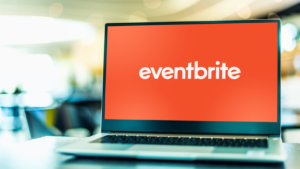Event professionals predict that the number one trend to improve attendee experiences is technology.
If you want to get on board this trend, you need to know what different event management software and tools can do for you, including real-time analytics, email marketing, automated workflows, and more.
Fortunately, there are plenty of free event planning software options you can try before you buy or use entirely for free.
Eventbrite is a top-rated all-in-one event management platform among event creators, so we have some experience in this field. To help you choose the best software for your needs, we’ve selected the top tools and apps that integrate with our comprehensive event management software and broken them down into their benefits, limitations, and pricing information.
Top Event Planning Software for 2025
1. Eventbrite
When it comes to affordability and functionality, Eventbrite stands out as a leading choice among free event management tools. It’s an industry leader for a reason, with almost 800,000 creators planning events on the platform each year. Here’s a breakdown of some key features:
Ticket sales
Eventbrite presents an intuitive interface for handling ticket sales, central to creating successful events. By creating an Eventbrite event page, event organizers can showcase their event’s details and sell tickets directly.
The platform allows you to customize ticket types and pricing, essential for catering to a diverse audience. It also provides real-time registration tracking, helping you to continuously assess your sales performance and the number of online registrations. You can also easily use promotional codes and discounts to increase sales and attract a larger audience.
The ease of managing ticket sales and insightful sales analytics ensure you have a solid grasp on your revenue streams, aiding in making informed decisions for current and future events. This level of control and insight into ticket sales makes Eventbrite a great choice for creators operating on a limited event budget, yet looking to maintain a professional ticketing system.

Event discoverability
Eventbrite excels in enhancing event discoverability through its powerful search engine.
This feature is pivotal in connecting potential attendees with events that match their interests.
The event management solution’s search functionality allows users to filter events based on parameters such as location, date, category, and price.
The emphasis on discoverability helps fill seats and build a community around your event, which is invaluable for brand building and customer loyalty.
You tap into a vast community of event-goers actively seeking new experiences by listing your event on Eventbrite. Eventbrite’s channels drive 30% of tickets sold on Eventbrite, thanks to the search bar to alleviate the creators’ marketing efforts.
Additionally, the platform’s search rankings boost your event’s visibility on search engines, broadening your reach. You can use your Eventbrite event page as your event website and increase organic traffic from search engines.
Event promotion
Promoting your event is imperative to ensure a good turnout and increase brand awareness. Eventbrite offers a range of tools designed to amplify your event’s reach and engage potential attendees. Here’s a closer look at how Eventbrite’s features facilitate event promotion:
1. Eventbrite Ads
Eventbrite Ads simplify promoting your event on Eventbrite. This feature boosts your event’s visibility on Eventbrite’s homepage, related event sections, and search results, ensuring it reaches a wider audience. With the clear reporting interface, you can also track your ads’ performance, giving you control over your ad budget and ways to optimize for better results.
2. Social media promotion
Leverage the power of social media to further promote your event. With Eventbrite, you can launch ad campaigns on Facebook and Instagram right from the Eventbrite platform, thanks to its social media integrations. Social media integrations allow you to target your niche audience, increasing ticket sales.

3. Email marketing
Engage your audience through Eventbrite’s robust email marketing tools. With no contact limits, automated workflows, and easily customizable templates, you can fast-track your email campaigns and maintain an engaged audience. Plus, you get clear insights from data collected from millions of events to help boost your open rates and engagement.
Eventbrite’s AI assistant can also help create engaging email content and reduce the time you spend writing emails from hours to minutes.
4. Automated event notifications
Keep your fans returning with automated event notifications. When users like, follow, or attend your events, Eventbrite sends automated notifications to remind them of upcoming events, ensuring sustained engagement and higher chances of repeat event attendance.
These marketing tools, coupled with Eventbrite’s easy-to-use interface, provide event creators with a comprehensive solution to effectively promote their events, reach a broader audience, and, ultimately, ensure the success of your events.
Ready to start using Eventbrite?

Free platform
Eventbrite’s event management platform is now FREE to publish events of any size.
- Publish unlimited events for free: You can publish unlimited events of any size without needing a Flex or Pro plan—this includes all event sizes, whether tickets are free or paid.
- Increase your event capacity: Sell more tickets to your already listed events at no extra charge.
- Ticketing Fees stay the same: Attendees pay a low-cost Ticketing Fees on paid tickets, unless you choose to cover them.
Eventbrite Pro
Eventbrite’s Pro plan offers incredible value for organizers who want to take their email marketing to the next level:
- More daily sends for larger audiences: Pro subscribers enjoy higher daily email send limits and unlimited contacts, making it easy to fully leverage Eventbrite’s powerful email marketing tool. Eventbrite emails deliver a 59% higher open rate than the industry average*, helping you reach more attendees and boost ticket sales.
- Lower Pro subscription cost: Eventbrite has lowered Pro plan prices by over 30%, making them even more affordable. Reduced Pro prices are as follows (see full list):
- Pro 2k (formerly Pro 100): Send up to 2,000 daily emails for just $15/month (USD).
- Pro 6k (formerly Pro 250): Send up to 6,000 daily emails for just $50/month (USD).
- Pro 10k (formerly Pro Unlimited): Send up to 10,000 daily emails for just $100/month (USD).
Annual subscribers automatically receive a 20% discount, and qualifying nonprofits can enjoy a 50% discount.
- 24/7 chat support for any event: Pro subscribers get round-the-clock chat support for both paid and free events—usually only available for paid events.
Integrations and single-platform advantages
Integrations with other tools unlock the platform’s full potential.
While other tools might be helpful, switching between them and your primary event planning platform can be a pain. That’s why using a platform that seamlessly integrates with other tools is such a lifesaver. Eventbrite integrates with all the tools in this post, so you have everything you hey need to create successful events.

2. HubSpot
HubSpot is a popular customer relationship management (CRM) platform that helps you store information about attendees and leads for customized marketing campaigns.
Benefits
- Automated workflows: Utilize event information to create automated workflows for personalized attendee engagement across email, social media, and other marketing channels.
- Enhanced visibility: Automatically sync new event registrants to HubSpot, ensuring a unified view of event engagements and tracking people attending your events at scale.
- Informed lead scoring: Analyze event data to prioritize ready-to-buy prospects, enhancing sales efforts if you use events in your sales funnel.
Limitations
- Sales-focused platform: HubSpot mainly focuses on helping companies make more sales at scale. If you’re a nonprofit or a small business, you may not see the benefits of its ability to store and process large amounts of sales data.
How free is it?
HubSpot provides a wide range of sales and marketing tools for free. Its email marketing platform, ad retargeting tool, and reporting dashboards are free but only for limited users from the same organization. Certain CRM features, automation capabilities, and more advanced analytics are available, though the plan starts at $20 a month.

3. Mailchimp
Eventbrite’s integration with Mailchimp forms a powerful synergy between event management and email marketing. You shouldn’t underrate sending emails quickly and easily; that kind of fast communication gives you the flexibility to address last-minute changes, which are the most common frustration for event creators. Here are the key aspects of this integration:
Benefits
- Automated communication: Mailchimp facilitates automated email communication with attendees, ensuring they are well-informed before and after the event and letting you keep in touch with past attendees. This is especially useful for virtual events, where you can send the event reminder and video call invite link without manual effort.
- Targeted campaigns: Leverage event data to create targeted email campaigns, enhancing engagement and turnout and optimizing as you get more attendee data.
- Real-time updates: Stay updated with real-time event registrations’ syncing and attendance data to track the success of your email marketing efforts.
Limitations
- Not event-specific: Mailchimp’s marketing software requires a lot of customization for templates and automation to adapt it to your event.
How free is it?
The integration’s core functionality is free, but advanced features may require a subscription. While Mailchimp offers a free tier, an array of features for advanced users and higher usage limits are available in the paid plans, as outlined on their pricing page.

4. Cyfe
Cyfe is a blend of online ticketing management and robust analytics. It stands out because its easy-to-use dashboard features pair very well with Eventbrite’s platform. Here’s a breakdown:
Benefits
- Real-time analytics: Cyfe’s dashboards provide real-time insights into your Eventbrite data, helping you change your strategy on the fly making it a valuable attendee engagement tool.
- Custom dashboards: Create custom dashboards to monitor the metrics that matter most to your specific event management goals.
- Data aggregation: Aggregate data from Eventbrite and other platforms to have a holistic view of your event performance.
Limitations
- Learning curve: There might be a learning curve to fully understand and utilize all the analytical features provided by Cyfe. Setup can be especially challenging as the UI and metrics differ from most other event management software.
How free is it?
Cyfe offers a free plan, which includes two dashboards with a 30-day history. However, a premium plan is available for more advanced features, additional dashboards, or a longer data history, as outlined on their pricing page.

5. Keela
Keela is a popular CRM for nonprofits. That focus can be both a benefit and a drawback, but its integration is a great way to enrich your nonprofit event management platform.
Benefits
- Automated CRM updates: Automatically add all event attendees to your CRM to carefully track repeat attendees and include them in future donation campaigns and event outreach.
- Insightful overviews: At a glance, view the number of tickets sold and the details of individuals who purchased them.
- Enhanced donor insight: Fill in previously missing information such as their company/organization, address, birth date, etc., which can be crucial for nurturing relationships and personalizing your engagement strategies with donors.
Limitations
- Nonprofit-only platform: Keela is only available to registered nonprofit organizations. But don’t worry; there’s plenty of other event management software out there!
How free is it?
Keela Starter, their free version, includes a limited number of CRM records, tax receipt automation, and customized donor forms. Its paid features, including automation, advanced reporting, and email marketing, scale with the number of contacts you want to store in your system.

6. Tixel
Tixel is a ticket reselling solution built to integrate with other platforms. Ticket resales are a great way to assure attendees that they don’t need to lose money or miss out completely, even if they can’t attend an event.
Benefits
- Secure reselling: Tixel’s modern anti-fraud technology holds tickets until an attendee makes a payment, ensuring a secure transaction between buyers and sellers.
- Wide audience reach: Resell tickets to millions of genuine fans at fair prices for any event you organize, including music, sports, arts, festivals, and more.
- User-friendly interface: Easily list tickets directly from your Eventbrite account or via official email and PDF tickets, making the resale process straightforward and hassle-free.
Limitations
- Pricing: Tixel’s per-ticket pricing model can significantly raise the price of your event for secondhand buyers, making it unappealing for resales.
How free is it?
Although it’s free to set up and start using Tixel, the software charges 5.9% to the buyer and the seller for every ticket sold. That means that while you don’t have to pay, your attendees will take a hit for every ticket they resell.

7. Envoy
As one of the most popular event registration tools, Eventbrite’s integration with Envoy modernizes the event planning process by replacing printed RSVP sheets with a sleek iPad sign-in system.
Benefits
- Automated import: Attendee information from Eventbrite automatically imports into Envoy, speeding up the sign-in process.
- Modernized sign-in: Replace outdated paper RSVP sheets with a digital iPad sign-in system and pre-print name badges for attendees’ ease.
- Real-time attendance tracking: At-a-glance access to monitor who’s arrived and who’s running late in a single, easy-to-use UI.
Limitations
- Pay-to-play: Envoy locks many additional features behind its paywall.
How free is it?
While the integration is free and Envoy’s most basic features are as well, it’s hard to take full advantage of the platform without paying. Name badges, analytics, automation, ID scanning, photos, and customized branding are all features that require payment.

8. Gift Up!
Eventbrite’s Gift Up! integration lets you sell gift cards people can redeem at your events. Customers can use Gift Up! card codes during checkout as an Eventbrite discount coupon.
Benefits
- Effortless gift card sales: Sell fixed or custom value gift cards directly on your website, providing a convenient way for customers to purchase gift cards for your events.
- Automated delivery: Offer both email and postal delivery for your gift cards. Buyers can have the gift card emailed instantly or schedule it for a special occasion, while postal orders allow for a physical gift card alternative.
- Flexible redemption: Let your customers use their gift cards online or in-person, wherever they choose to register for your event.
Limitations
- Steep learning curve: The people using Gift Up! will need to learn to use it, which could lead to frustration if they have trouble adapting to the new technology.
How free is it?
Gift Up! operates without monthly or setup fees, as outlined on their pricing page. They charge a fee of 3.49%, but you can pass it on to your customers, making it genuinely free. If you prefer, there are options for pre-paid bundles that could save you (or your customers) money in the long run.

9. Zapier
Zapier serves as a conduit for automating tasks between Eventbrite and other apps, amplifying efficiency in event task management and making your entire event planning process more manageable.
Benefits
- Automated workflow creation: Design and implement automated workflows that trigger based on Eventbrite actions, such as new event creation or ticket sales, to streamline operations across various applications.
- Extensive app connectivity: Connect Eventbrite with over 5,000 other apps through Zapier, allowing for a wide variety of automation possibilities that can save time and reduce manual data entry.
- No-code automation: With Zapier’s no-code platform, create and customize integrations effortlessly, making it accessible for individuals without technical expertise. Although it can seem intimidating at first, you can learn Zapier quickly without too much trouble.
Limitations
- Pricing tiers: While basic automation is an option with Zapier’s free plan, more complex workflows or higher task volumes may necessitate a paid plan. It’s easy to forget you don’t have unlimited tasks, especially when learning how to use the software!
How free is it?
Zapier offers a free plan for basic automation needs alongside a range of paid plans for more advanced workflows or higher usage.
Make your event planning a breeze
There are so many event apps and software options at our fingertips that can improve the event-planning process and the event experience.
Think about the tasks you find most challenging or the ones you leave on the back burner and procrastinate over regularly. Try using software to reduce that friction and free you up to focus on the aspects of event planning you enjoy.
With Eventbrite’s free features plus all the integrations with other free event software platforms, the choice is yours.






